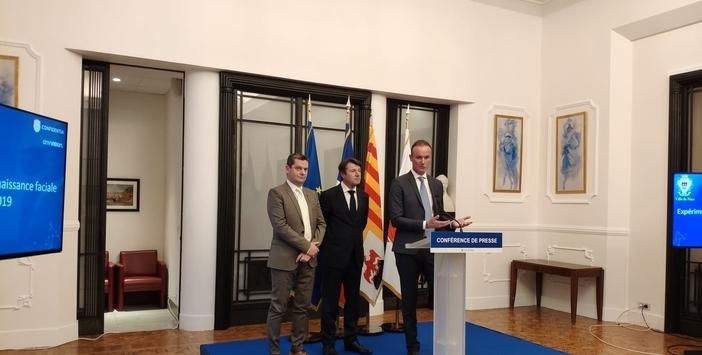In a press conference, the mayor of Nice and President of the Nice Côte d’Azur Metropolis, Christian Estrosi, presented the experiment of facial recognition for the 2019 edition of the carnival.
The city of Nice is known for its interest in new technologies serving citizen safety. In January 2018, the Reporty application was tested but then banned by the National Commission for Computing and Liberties (CNIL), arguing that the law did not allow the implementation of such technology. Reporty is a smartphone application enabling citizens to film an offense in real-time, connected to the Urban Supervision Center.
“We have relaunched the Reporty experiment previously canceled by the CNIL. Today, we are working with them so that it becomes an experiment in the hands of citizens with this application,” announced Christian Estrosi. The mayor of Nice addressed criticism, particularly against the “Two-I” solution, which develops an emotion detector for use in specific contexts (such as public transport).
“I want to address the various articles that have largely caricatured this tool. The principle is not to know the mood of Mrs. X or Mr. Y, but the operator sees colored dots on the screen, not faces, based on the seven identified emotions. This means that in an assembly where ten people are displayed in red, it would indicate a general emotion that is an alarm signal for us. We cannot remain unresponsive. But at no time will we see any individual face appear,” he explained to journalists.
In a January 2019 article published on the Médiapart blog site, David Nakache, the President of the association “Tous citoyens,” strongly disapproved of this technology, drawing a parallel with the biopolitical concept developed by Michel Foucault. “We must no longer judge actions alone but individuals themselves. Not simply evaluate a person’s behavior just because they have committed a dangerous act, but evaluate everyone’s behavior, everywhere, all the time, as every individual becomes a potential danger,” he wrote.
Today, the city is launching another type of experiment involving facial recognition. Since the carnival’s opening on February 16, this technology has been tested in a restricted area with a panel of 1,000 volunteers, all of whom willingly participated. Signs were placed to inform the public that they could take another access route if they did not wish to participate. It’s the Monegasque cybersecurity company Confidentia developing this solution called “Any Vision.”
“It allows for real-time analysis as well as playback and delayed review. It operates on a photograph in very low resolution of about 45 pixels. A camera located 300 meters away can perform facial recognition with this resolution and accounts for aging over 20 years,” specified Christian Estrosi.
Following the development of a complete impact study and discussions with its services, the CNIL authorized launching this experiment during the carnival. Three scenarios are enacted in the field to test the reliability of facial recognition, achieving several objectives:
– Improve access controls and make them more effective by replacing badges with facial recognition.
– Detect a person of interest in the middle of a crowd.
– Locate a person of interest in public areas.
A “person of interest” may denote someone sought by police services or listed in the context of an investigation. It could also refer to a child who has escaped parental supervision in public spaces. The system can only function if a photo of the individual is transmitted to the police, who can then initiate analysis via the cameras installed in Nice (again, referring to a specified carnival zone).
“The results are presented in a report that we will send to parliamentarians, the government, Prefect Renaud Vedel, who is in charge of a mission for the Prime Minister on the required legislative changes to enable the use of new technologies. And also to the CNIL within two months,” explained Christian Estrosi.
If the experiment is successful, a bill will be drafted to amend the 1978 Data Protection Act and the 1995 regulations on video surveillance.
As a reminder, the Data Protection Act guarantees the liberty of processing personal data. Article 1 ensures that computing should never infringe on human identity, human rights, privacy, or individual or public freedoms. Thus far, any personal data may only be collected under certain conditions. Let us hope this endures.


